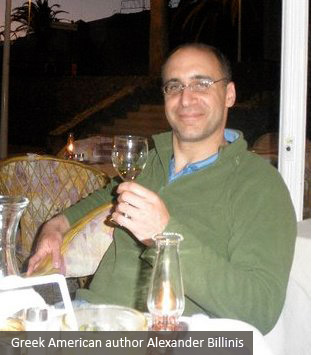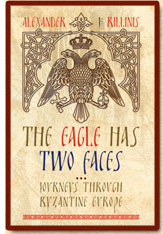The Double Headed Eagle, the symbol of the Late Byzantine Empire, speaks eloquently to the worldview of the Byzantines, whose Empire looked both to the East and to the West, but never was—or is—really part of either. At its apogee, the Byzantine Empire was the highest civilization in Europe—the Center. This Double Headed Eagle is cherished by the Balkan Orthodox successors to Byzantium, and versions of it grace the national flags of Serbia, Montenegro, and even Albania.
by Demetrios Rhompotis
 Alexander Billinis’ book “The Eagle has Two Faces”, published recently and available at amazon.com and virtually all other online retailers, offers history, architecture, personal experiences, and numerous anecdotes to expound on key central themes. First, that the Balkan Orthodox nations form a common culture and virtual commonwealth, while still maintaining ethnic, geographical, and linguistic diversity. Second, the common experience of Ottoman rule, while preserving Byzantine culture and insulating the Orthodox Catholic Church from Roman Catholic encroachment, did so by cutting off Byzantine Europe from economic, political, cultural, and civic development in progress in Western Europe. Finally, throughout, there is a sense that history, rather than linear, runs in a circular form, and that history once again encroaches on the lands of the Double Headed Eagle.
Alexander Billinis’ book “The Eagle has Two Faces”, published recently and available at amazon.com and virtually all other online retailers, offers history, architecture, personal experiences, and numerous anecdotes to expound on key central themes. First, that the Balkan Orthodox nations form a common culture and virtual commonwealth, while still maintaining ethnic, geographical, and linguistic diversity. Second, the common experience of Ottoman rule, while preserving Byzantine culture and insulating the Orthodox Catholic Church from Roman Catholic encroachment, did so by cutting off Byzantine Europe from economic, political, cultural, and civic development in progress in Western Europe. Finally, throughout, there is a sense that history, rather than linear, runs in a circular form, and that history once again encroaches on the lands of the Double Headed Eagle.
 What makes this book exceptionally familiar to the Greek American community is the fact that Alexander Billinis is himself a Greek-American who has a lifelong interest in Byzantine history and its relevance to today’s world. His point of view is greatly influenced by being part of the Diaspora, which makes him both an insider and outsider to the Balkan region where Byzantium’s successors experience a rather complicated and frustrating existence. He has lived and worked in Bulgaria, Greece, and Serbia, and has traveled extensively to other countries that have had influence on the Balkans, including Turkey, Italy, Austria, and Hungary. His interest in this area’s culture and history is balanced by the calculating analyses of an international banker, his career for more than a dozen years. A graduate of Georgetown University’s School of Foreign Service, Mr. Billinis majored in East European Studies just as the Communist bloc was in the process of dissolution, at a time when history and culture once again emerged over ideology. He followed his studies with a semester at Budapest University of Economic Sciences and an internship in Sofia, Bulgaria. He also earned advanced degrees in international business and law.
What makes this book exceptionally familiar to the Greek American community is the fact that Alexander Billinis is himself a Greek-American who has a lifelong interest in Byzantine history and its relevance to today’s world. His point of view is greatly influenced by being part of the Diaspora, which makes him both an insider and outsider to the Balkan region where Byzantium’s successors experience a rather complicated and frustrating existence. He has lived and worked in Bulgaria, Greece, and Serbia, and has traveled extensively to other countries that have had influence on the Balkans, including Turkey, Italy, Austria, and Hungary. His interest in this area’s culture and history is balanced by the calculating analyses of an international banker, his career for more than a dozen years. A graduate of Georgetown University’s School of Foreign Service, Mr. Billinis majored in East European Studies just as the Communist bloc was in the process of dissolution, at a time when history and culture once again emerged over ideology. He followed his studies with a semester at Budapest University of Economic Sciences and an internship in Sofia, Bulgaria. He also earned advanced degrees in international business and law.
Working for various global banks took him and his family from Utah, to Chicago, to Athens, and to London. He has written for various Diaspora Greek and Serbian publications in the US, Canada, Greece, and Australia, including NEO magazine where he contributes every month an essay in a series titled Hellenism Without Borders. He currently lives in Sombor, ‘Serbia’s most architecturally beautiful city,” as he likes to point out, with his Serbian-American wife and their two young children. “The Eagle has Two Faces” is his first book.
You are an American living in Serbia. Is that possible after what happened in the ‘90s?
It is easy enough. Most people here see me as a Greek and the ties between Greeks and Serbs are very warm. While most Serbs feel the bombing and the amputation of Kossovo from Serbia was a gross injustice orchestrated in part from America, the Serbs do not overly personalize their feelings towards individual Americans. I would say that the Anti-Americanism I have seen in Serbia is similar to that in Greece, but by no means worse. Further, the province I live in, Vojvodina, has over two dozen nationalities in the region, Serbs, Hungarians, Romanians, Slovaks, Carpatho-Russians, Croatians, Gypsies, and others, including Greeks, and most of these people have centuries-long ties to the region. Tolerance is the norm, rather than the exception.
After the disastrous decade of the ‘90s, Serbia and the Balkans in general, came to symbolize in the West almost everything that’s bad and negative (built perhaps on an already existing stereotype that goes back to the Ottoman times). Would you say that your book is also an unconscious attempt to challenge that image?
To some degree. The Byzantine civilization shared by Greeks, Serbs, Bulgarians, and Romanians was the most advanced civilization of the Middle Ages, and it was set upon by both the West and the Ottomans. My point is that 500 years of Ottoman rule arrested our development and is a direct cause to the political and economic problems we see today in the Balkan countries, including of course Greece. My further point is that the Orthodox Balkan people all have a common culture and the differences are less important than the similarities.
To go to your direct question, I think that there are elements of the Balkan stereotype that have basis in fact. There is severe, debilitating corruption in all Balkan countries, which directly relates to Greece’s financial meltdown. I seek, with a meze of travels in the region, to offer a more complete view of the Balkans. My view is of course influenced by my Greek-American identity, and of course, that of my Serbian-American wife.
There is no extensive bibliography on the Southeastern European Hellenic Diaspora. Certainly your book is filling an ozone hole size of a void. But why do you think that is the case? Greeks were too traumatized to remember what we lost relatively recently?
Diaspora is a key part of this book, but it is not so much Greeks living in, say, Bulgaria or Serbia, but rather the need for all Balkan peoples to quit their countries for the West and a better life. The political, economic, and cultural baggage of Ottoman rule, and the continuation of what were essentially Ottoman norms of governance after the expulsion of the Ottomans, encouraged (and continues to encourage) the most ambitious and civic-minded Balkan people to leave the region. I do not dwell particularly on the once substantial Greek mercantile communities in Bulgaria, Serbia, and Romania, although often enough people from old Belgrade families will talk about their Greek origins. Most of these communities either repatriated to Greece, or, more often, assimilated into their Byzantine surroundings.
What is the structure of the book, I mean, did you have a certain pattern in mind?
A great question. Organization was never my strong suit, I suppose that is typical of a Greek! It is a bit of stream of consciousness book, my travels are not linearly linked, but rather geographic or episodic. I cover both the core successor states of Byzantium and the periphery. As I live in an area where Orthodoxy fades into Western Christianity, I discuss the Roman Catholic-Orthodox relationship a fair amount, both in terms of the Serbs and Romanians in the former Austria-Hungary, but also the enclaves of Greeks and Arvanites in Italy. The two areas that I do not cover that might have been valuable, are Albania and Bosnia, but a travelogue on such a dense and culturally profound area as the Balkans can never really be complete.
If I judge from your series Hellenism without Borders in NEO magazine, you combine history and prose in a way that makes the text readable to every “commoner” while at the same time you maintain the scientific integrity when it comes to events and other historical data. Is the book done the same way?
Thank you, it is always good to hear that. I would say that the reader who enjoys my column would likely enjoy the book a great deal. I delve into places in greater depth, and with greater sharpness. One critic called my book “the author’s love affair with the Balkans.” I hope and I believe that love has not made me blind, because while there is much to love in this part of the world, there is also much that simply needs to change, if the region is to have any chance in the 21st century.
What do your Balkan, non-Greek, friends think about the book?
As I live in Serbia and along with my Greek and American publications, I write for several Serbian and Serbian Diaspora publications, I can speak for Serbian reactions, and they generally have felt that the book is accurate. I have a soft spot for the Serbs and it comes out in my writing, but I make no excuses for the corruption and the civic deficit in Serbia or in Greece, and I think that any Balkan who holds a very rose-colored, nostalgic view of their country or region will find my conclusions jarring. If I wrote this book from far away, in Salt Lake City, Chicago or Washington D.C., all places where I have lived, for example, I might be more overcome with emotion than I am now, living the often challenging realities of life in the Balkans.
Besides the joy or writing and sharing experiences, what’s the purpose of this book, in other words, what do you expect from it in the best-case scenario.
What does every author expect, a best seller of course! As I said in an earlier response, this book was like my therapy. Being a Greek is a very full experience, and the whole Balkans is a cauldron of both joyful and often profoundly disappointing experiences. I dedicated this book to my late father, John, and to his grandson, my son, also, of course, John. It is to honor them first and foremost, but I also think that my experience and insights might interest a wide variety of people.
Where can people find it?
Well, I am a new author but I have to say that in the world of online retailing it is easy to get my book. Amazon.com and virtually any other online retailer have my book on offer. I cannot imagine how hard it must have been to market one’s book in the past, particularly as a first time author. I have a global audience, I write for publications in Europe, North America, and Australia, and my book can be purchased anywhere. Do also visit my website and blog www.alexanderbillinis.com
Any other book in the offing or it’s too early?
Yes, there is. I am a few chapters into another travel-historical book about Vojvodina province and its Austro-Byzantine culture with its two-dozen nationalities. When we eventually return to the US I want to write about America. It is always a challenge to write about your home country.



















